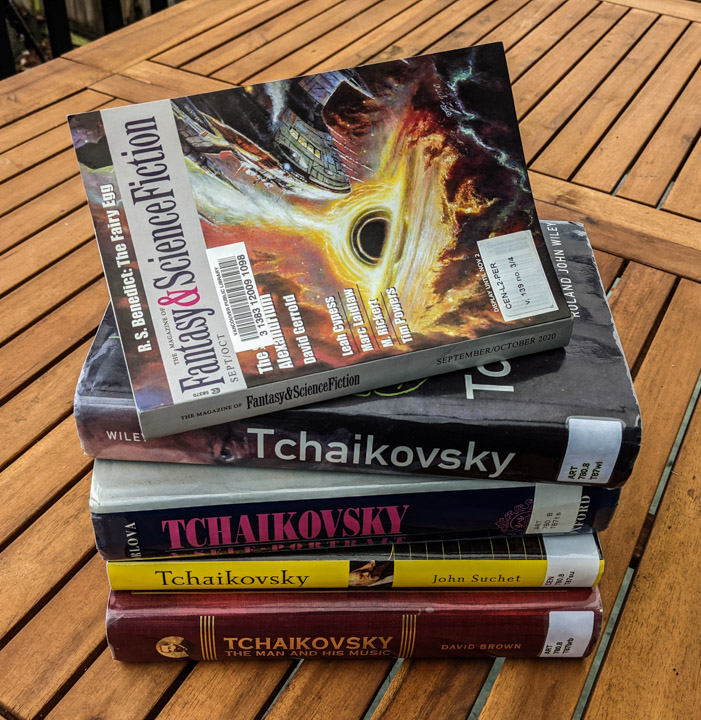
This is a story about researching Russian music, about Italian adulterers in Hell, and about pulp sci-fi featuring fairy-cursed princesses. To be honest, it’s largely about editing Wikipedia, why it’s fun and rewarding and maybe you should too.
What happened was, on Friday there was a Twitter challenge: “What's a great song that is over 10 minutes in length?” I replied “Francesca da Rimini” and without thinking too much switched over to YouTube and, since I was about done with things and ready for bed, dialed up this pretty good performance by Igor Manasherov and the Moscow Philharmonic. While I was enjoying that, I had a glance at the Wikipedia entry (that’s a pointer to the entry as of Friday night) and was saddened — it opened with three windy paragraphs about themes and influences which lacked even one citation, some rando injecting amateur-music-critic opinions into Wikipedia. Obviously had to be fixed.
A word on the music · I’ve loved this piece of music since I stumbled into a live performance in Switzerland at the Lucerne festival while on a business trip sometime around 1990. If you want to know more about it, I blogged about it back in 2006, and then the Wikipedia entry as I write this is full of well-cited factual material, including descriptions by contemporary critics and praise from Saint-Saëns.
To the library! · We had some running around to do on Saturday so I tacked on a stop at the Vancouver Public Library’s Central Branch. I’d already poked around and found three respectable Tchaikovsky biographies that were said to include have good coverage of the music, including one (Tchaikovsky: A Self-Portrait by Alexandra Orlova) which is an assemblage of Tchaikovsky’s own writings.
In normal times I would have gone to the library, grabbed the books off the shelves, sat down with my computer at a quiet table, and done my editing there and then.
But the stacks are closed because of Covid so you have to talk to a person at the Info desk to order the books you want and somebody brings them to you after a few minutes. During which you walk around the main floor and look at the new books and comics and magazines. My eyes were captured by the cheerful luridness of the September-October Fantasy & Science Fiction cover. So on impulse I brought that home, along with Tchaikovsky.
Editing · One of the biographies turned out to be useless, but the other three each had a good index, so I could skip through all the mentions of Francesca. It was only an hour or two’s work to pull a few together and reorganize the entry. Now, rather than offering opinions about Tchaikovsky’s influences, it quotes his own remarks on the subject — yes, he was influenced by Ring of the Nibelung which he’d seen at Bayreuth, even though he found it “very antipathatic”.
Bonus! · After I’d finished editing I picked up Fantasy & Science Fiction, feeling all nostalgic. About 300 years ago, as an undergraduate I lived in a student house full of Sci-Fi hounds and we bought F&SF every month, along with Azimov’s Science Fiction, and passed it from hand to hand. It’s still got unironic Space Opera covers entirely unrelated to any stories inside. It’s still got klunky typography on cheap paper. It’s still got lots of reviews and amusing classified ads.
What’s different is that the stories are 100% free of the egregious sexism that marred twentieth-century sci-fi and fantasy.
I really enjoyed, and unhesitatingly recommend, Of Them All, a novella by Leah Cypress. It’s good old-fashioned fantasy about two princesses, neither particularly lovely, one fairy-cursed at birth: “You will be beautiful only to those who wish you harm.” What a great premise! And nicely developed.
Downside · I’ve loved Francesca da Rimini for thirty years but it’d never occurred to me to wonder who Francesca might have been — a real person, it turns out. The work is inspired by Dante Aligheri’s description, in Inferno, of the eternal punishment in Hell of Francesca and her adulterous lover. Which was pretty gruesome, and now that I know about it, I have to grant that Tchaikovsky did a fine job of painting the picture musically. Which is not helping my enjoyment of the music, but I’ll probably get over it.
You can too · Edit Wikipedia, I mean. Everybody is an expert in a few things, at the very least the neighborhood they live in, some aspects of their profession, and likely one or two extracurricular interests.
It’s this simple: Whenever you see something wrong in Wikipedia, just fix it. It doesn’t need to be time-consuming and I never find it tedious. Plus, you’re enriching the world that everyone lives in.
By .
The opinions expressed here
are my own, and no other party
necessarily agrees with them.
A full disclosure of my
professional interests is
on the author page.
如有侵权请联系:admin#unsafe.sh
